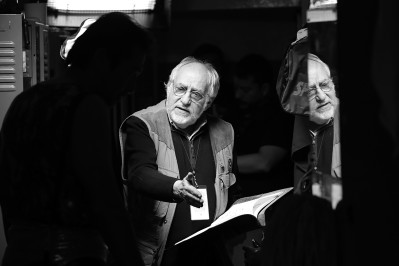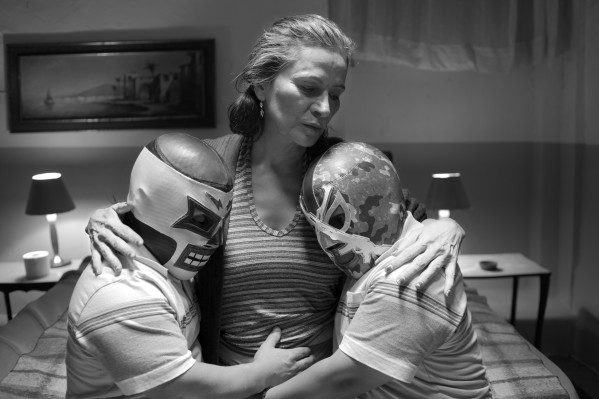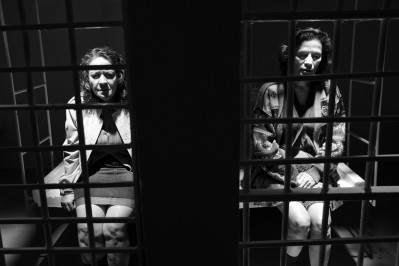INTERVIEW: Arturo Ripstein’s ‘Bleak Street’ explores truth in surreal crime story

In Bleak Street, Arturo Ripstein, the celebrated director of such modern classics as Deep Crimson and Such Is Life, turns his lens on a surreal story of crime, loss and luchador wrestling on the tough streets of Mexico City. Shot in haunting black and white, and featuring a script by his frequent collaborator and wife Paz Alicia Garcíadiego, the movie follows two prostitutes (Adela played by Patricia Reyes Spíndola and Dora played by Nora Velázquez) who struggle to secure clients after so many years in the business. When they find twin professional wrestlers (Juan Francisco Longoria and Guillermo López), two little people who refuse to shed their luchador masks, the women believe they have finally found a financial opportunity. What they don’t know is how complex and troublesome this fling will become.
Ripstein has the story play out in a truthful manner. Even though some of the wrestling references and side characters make the plot seem surreal, Bleak Street is very much steeped in an almost documentary-like style. The story becomes bizarre and takes dark, dark turns, but every character is conscious of their fragility, their inability to climb higher in society, their yearning for something more.
“Well, this is a piece of news that happened in Mexico,” Ripstein said recently in a phone interview. “It was quite talked about for a couple of days, but here in Mexico, the next disaster just seems to evaporate the last one. So it was extant for a few days, and then it left.”

Ripstein talked about the story with Garcíadiego, his wife, and they both found the tale “fascinating.”
“We’ve been doing films together for more than 30 years, so we discuss each one of them,” he said. “And we shoot ideas at each other, and there’s a very many false good ideas that we discard soon. But this one, I didn’t discuss. This one just happened like that, and she went into her study. And she started to write it. I didn’t know what she was writing about, and three-four months later, she came out and said, ‘Well, read this, and see what you think.’ Of course, I went through it, and I thought it was fascinating.”
Bleak Street was filmed in a stark black and white. Ripstein said the decision, one that he has continued throughout his career, was because he originally learned how to make films in black and white.
“I didn’t go to film school because there wasn’t any when I was an apprentice,” he said. “Everything I saw and all the films that were fundamental for me were black and white, so I always understood life to be black and white. All my films, except maybe a couple, were really thought about in black and white. So I won’t try to do it, of course, for commercial reasons. … But I think it adds one element, which is the lack of color and the imagination necessary for the spectator.”
Ripstein said without color there’s also a lack of that quality that makes “things larger than life.” The director believes that films shot in color resemble reality, but he’s not interested in reality. He prefers a different term: “truth.”

Bleak Street was shot on location in the old downtown area of Mexico City among the apartment buildings and alleyways of the down-on-its-luck neighborhood. Actually, the real story that inspired the movie took place two or three blocks from the filming locations, said Ripstein, adding that the two women central to the plot work in an area “where many, many of the prostitutes in the city dwell for the not-too-affluent society.”
Ripstein’s exploration of these two central characters is a solemn, sometimes heartbreaking look at the aging process and how identity can often be shaped by one’s interactions with others. “When I was a young kid, I remember listening to someone say, ‘It’s horrible growing old,'” Ripstein said. “And someone else said, ‘It’s worse not getting there.'”
Spíndola is an actress who has frequently worked with Ripstein. Velázquez is actually a comedian and hasn’t worked in a dramatic role like this one. Also among the cast is Sylvia Pasquel, a telenovella actress who plays the mother of the two wrestlers, known by their ring names Little Death and Little AK. Pasquel is actually the daughter of Silvia Pinal, an actress famous several films, including Luis Buñuel’s Viridiana.
The two wrestlers remain at a distance throughout the movie, in part because they keep those masks on at all times. Ripstein said in the culture of Mexican wrestling, their secretiveness is not a peculiarity.
“It’s not rare to find wrestlers, these lucha libre wrestlers, with masks constantly,” he said. “I remember one of the most famous when I was a young director in the studio was a guy called El Santo. He was monumentally famous in Mexico, and he made these movies, and then went to the commissary and ate with the mask on. That was a sight to see, so you constantly find around places where they have the fights, these guys walking around with the masks on. It’s not a peculiarity; it’s just Mexico’s bizarreness.”
In some ways, Mexican wrestling, like its counterparts in the United States and around the world, is a metaphor for the triumph of good over evil. “You knew who the good guys were and who the bad guys were up in the ring, and it was clear,” Ripstein said of his memories of the sport. “They [the bad guys] were the brusque and ferocious ones, and the technical ones … were the good guys. They usually won but not necessarily, so it was quite, quite a show. And it’s still important.”
The director recognizes that a film shot in Mexico by a Mexican director may play differently in one city versus, say, New York City, where Bleak Street is currently running at the Film Forum.
“You see a Hungarian film happening somewhere in Budapest, and in Budapest it means certain things,” he said. “Of course, in Mexico, there’s a lot of cultural keys that are more integrated, but if this film is any good, it’ll be bizarre anywhere.”
By John Soltes / Publisher / John@HollywoodSoapbox.com
- Bleak Street is currently playing New York City’s Film Forum. Click here for more information on tickets.

